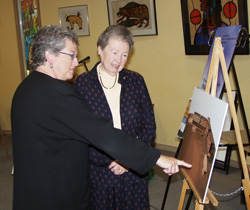

| Daily News | News Releases | Special Bulletins | Feature Archives |
| The View from Trent | Trent Magazine | Focus Trent | Build 2000 |

Trent Celebrates Funding for Performance Space in First Peoples House of Learning
 On
Friday, September 27, Peterborough MP Peter Adams announced that the federal
government's 'Cultural Spaces Canada' program has approved $854,000 in
funding to assist with costs associated with the construction and equipment
for the First Peoples House of Learning (FPHL) performing arts space.
On
Friday, September 27, Peterborough MP Peter Adams announced that the federal
government's 'Cultural Spaces Canada' program has approved $854,000 in
funding to assist with costs associated with the construction and equipment
for the First Peoples House of Learning (FPHL) performing arts space.
The announcement was made at a gathering of members of the Trent community
including the Native Studies Department, Friends of Native Studies, representatives
of local First Nations, Trent's Board of Governors and students, faculty,
and staff, and Otonaabe Women's Hand Drum.
Speaking on behalf of the Minister of Canadian Heritage, the Honourable
Sheila Copps, Peter Adams said, "The government of Canada is committed
to working in partnership with Aboriginal peoples and communities, and
to encourage cultural expression. This funding will help to ensure that
the First Peoples House of Learning truly reflects the needs of the people
who use it."
Trent University President and Vice Chancellor Bonnie Patterson commended
the federal government, Minister Copps and Peter Adams for their support.
"On behalf of the Trent University community we want to thank the
federal government for its decision to invest in this special project
which is of national importance," President Patterson said. She also
paid tribute to Trent faculty and staff whose vision and dedication have
supported the ongoing planning for the FPHL, and the three local First
Nations of Alderville, Curve Lake and Hiawatha who supported Trent's application.
Ms. Patterson emphasized that the new federal funding signals an important
milestone in the history of Native studies at Trent University. "The
performance space within the First Peoples House of Learning will showcase
the academic excellence and spiritual traditions that are the foundations
of North America's best Native studies program."
Professor David Newhouse, chair of the Native Studies Department, noted
that the FPHL will be much more than a building with inspirational architecture.
"The FPHL is a community of learners who have come together for the
purpose of increasing our understanding of ourselves, each other and the
world that we live within and to seeking peace through the use of our
minds. It will help to ensure that the physical, emotional, mental and
spiritual aspects of Aboriginal knowledge, as reflected in traditional
and contemporary world views and expressed in practise are articulated,
discussed, documented, recognized and experienced."
Speaking on behalf of Native students, graduate student Diane Gray
noted that "through performance, ceremonial and traditional teachings,
and formal lectures by First Nations Elders, faculty and guests, the
FPHL will be a place for and about the First Peoples of Canada."
She
emphasized that Trent University is a special place that offers
students a vast support network. Gray added that we must remember the
lessons of indigenous cultures that teach us that "we are nature's
subjects, not its masters, therefore to survive we must become 'true
citizens of the natural world' once again."
The FPHL will be
a central part of the new college being constructed on the east bank of
Trent University. In addition to serving as a new home for Trent's Native
Studies Department, the FPHL will include Aboriginal performance space,
gathering space, a First Peoples lecture hall and a natural amphitheatre
in a courtyard. The design of the FPHL will complement the University's
master plan, which seeks to animate activity on the East Bank and create
a stronger orientation towards the Otonabee River. The college will also
include a 250-bed residence and academic space for the departments of
business administration, economics, mathematics, Native studies, and the
Office of Research and Graduate Studies.
The Department of Canadian Heritage's Cultural Spaces Canada program is
mandated to improve physical conditions for artistic creativity and innovation.
It is also designed to increase access for Canadians to performing arts,
visual arts, media arts, and to museum collections and heritage displays.
The program supports the improvement, renovation and construction of arts
and heritage facilities.
Established in 1969, Trent University's Native Studies Department was
the first in Canada to offer a Native studies honours program (1979) and
a Native studies Ph.D program (1997). Native studies is a multi-disciplinary
examination, analysis and reflection upon Aboriginal experience in Canada
and the world. This exploration, based on western and aboriginal epistemologies,
aims to develop a more complex understanding of this experience in its
many dimensions: political, economic, social/cultural and spiritual. In
addition to the degree programs, a two-year diploma program is all offered
to students who have the equivalent of Grade 12 or who qualify as mature
students.
Photo: Trent University President Bonnie Patterson and Marlene Brant Castellano, co-Chair of the Friends of Native Studies Council, study architectural renderings of the First Peoples House of Learning.